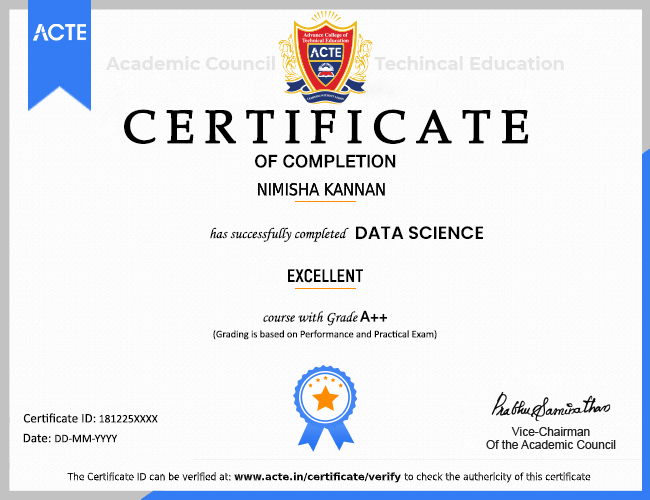Learn (Statistics & Machine Learning + Data Wrangling & Visualization + Big Data & Cloud Computing + Deep Learning & NLP + AI & Data Ethics ) at ₹28,320 - Only. Grab now
Data Science Training With 100% Placement
- Training for Experienced and New Learners.
- With 14+ Years of Certified Data Science Expertise.
- Professional Training With 100% Placement Assurance.
- 445+ Clients for Recruiting and 10315+ Trained Students.
- Access videos, study materials, and interview questions.
) 3K+
3K+
-
Course 1 Statistics and Machine Learning
-
Course 2 Data Wrangling and Visualization
-
Course 3 Big Data and Cloud Computing
-
Course 4 Deep Learning and NLP
-
Course 5 AI and Data Ethics
-
Hands-on Project (Predictive Model, Data Visualization, NLP Tool)
-
Job Preparation (Aptitude, Resume Preparation, Mock Interview)
Our Top Placement Companies










Key Highlights


Placement Assistance

Exclusive access to ACTE Job portal

Mock Interview Preparation

1 on 1 Career Mentoring Sessions

Career Oriented Sessions

Resume & LinkedIn Profile Building
Curriculum Designed By Experts
Expertly designed curriculum for future-ready professionals.
Industry Oriented Curriculum
An exhaustive curriculum designed by our industry experts which will help you to get placed in your dream IT company
-
30+ Case Studies & Projects
-
9+ Engaging Projects
-
10+ Years Of Experience
Data Science Training Projects
Become a Data Science Expert With Practical and Engaging Projects.
-
Practice essential Tools
-
Designed by Industry experts
-
Get Readl-world Experience
Image Classification
Develop a model that can classify images into different categories, such as identifying objects or recognizing handwritten digits.
Time Series Forecasting
Use historical data to predict future patterns and trends, such as predicting stock prices or forecasting demand for a product.
Customer Segmentation
Segment customers into distinct groups based on their behavior, demographics, or purchase history to better understand their preferences and needs.
Color Detection
Build an algorithm that can detect and extract colors from images. Use computer vision techniques, image processing, and clustering algorithms to identify and segment colors present in an image.
Diabetic Retinopathy
Create a model to detect and classify diabetic retinopathy in retinal images. Use image processing, feature extraction, and deep learning techniques to identify the severity of the disease.
Brain Tumor Detection
Develop a model to detect brain tumors from MRI scans. Use image processing, feature extraction, and deep learning techniques to accurately identify the presence and location of tumors.
Object Detection
Develop a model that can detect and classify objects within images, using techniques like deep learning and convolutional neural networks (CNNs).
Fraud Detection
Build a model to detect fraudulent transactions in a financial dataset, using techniques such as anomaly detection or supervised classification.
Time Series Forecasting
Use historical time series data to develop a model that predicts future values, such as stock prices, weather patterns, or energy consumption, using techniques like ARIMA, LSTM, or Prophet.
30+ Skill to Master
Python
NLP
PySpark
Data Analysis
Data Wrangling
Story Telling
AI
Machine Learning
Model
GIT
MLOps
SQL
Data visualization
Prediction Algorithms
12+ Tools to Master








Data Science Certification

Data Science certifications can enhance your credibility and employability in the field. They demonstrate to employers that you have the necessary skills and knowledge to work on data-related projects.
Some popular Data Science certification programs include:
While a certification is not always required, it can be beneficial, especially for those starting their careers or looking to switch to Data Science. It helps you stand out in a competitive job market.
Prerequisites vary depending on the certification program, but they often include a basic understanding of statistics, programming (e.g., Python or R), and mathematics. Some advanced certifications may require prior work experience.
The duration varies based on the program. Some certificates can be completed in a few weeks, while others may take several months. Full-time or part-time options are often available.
Yes, it’s possible to get a job with a Data Science certification and relevant skills, but having a degree (e.g., in Computer Science, Statistics, or a related field) can be an advantage for certain positions.
Certifications like the IBM Data Science Professional Certificate, Google Data Analytics Professional Certificate, or Microsoft Certified: Azure Data Fundamentals are suitable for beginners.
Job Assistant Program
Your Intent To Master Next Level Skills Are Appreciated
We Take Pride In Being Part Of 4 Lakh Plus Career Transition Worldwide
Our Requirement Strong
-
Course Completion
Get hands-on training from experts.
-
Resume Building
Experts help you in building the best of your portfolio.
-
Group Discussion
Know where you stand in the skill mastery
-
Mock Interviews
Experience real-time interviews with SMEs
-
Placements
Facilitating career success through strategic industry placements












100+ Organizations Trust Us With Their Openings
ACTE has earned the trust of over 100+ organizations as their preferred partner for identifying top talent to fill job openings. Our extensive experience and proven track record have solidified this trust, making us the go-to choice for businesses seeking the right candidates for their vacant positions. In this article, we will explore the factors that underpin this trust and how our unwavering dedication to excellence consistently delivers outstanding outcomes.
1000+ Hiring companies
3K+ Student already placed
Career Transition
-
55% Average Salary Hike
-
45 LPA Highest Salary
-
12000+ Career Transition
-
400+ Hiring Partners

Harika Fresher
Data Analyst | Bengaluru
Got 3 LPA Package
More Details: My journey from being a fresher to a data analyst was made possible by ACTE. The comprehensive training in data analysis, tools, and hands-on projects allowed me to transition seamlessly. I’m now analyzing data and making data-driven decisions with confidence, thanks to ACTE.

Harshitha Fresher
Business Analyst | Chennai
Got 3 LPA Package
More Details: ACTE’s Business Analyst program transformed me from a fresher into a business analyst with a deep understanding of business processes and analytical skills. The experienced instructors and practical exercises made the transition smooth, and I now contribute to strategic decision-making in my role.

Arjun Fresher
Data Engineer | Hyderabad
Got 3 LPA Package
More Details: I owe my transition to a data engineer to ACTE Training Institute. Their rigorous training in data engineering technologies like SQL, Hadoop, and Spark prepared me for the role. I entered the workforce with hands-on experience and the expertise needed to succeed as a data engineer.
Job Opportunities in Data Science
More Than 35% Of Developers Prefer Data Science. Data Science Is The Most Popular And In-Demand Programming Language In The Tech World.
You can Work as a
Upcoming In-Demand Jobs
Salary in Data Science
- Business Analyst ₹3 LPA to ₹5 LPA
- Data Analyst ₹3 LPA to ₹6 LPA
- AI Engineer ₹4 LPA to ₹8 LPA
- Quantitative Analyst ₹4 LPA to ₹8 LPA
- Data Engineer ₹4 LPA to ₹7 LPA
- Data Scientist ₹6 LPA to ₹10 LPA
- Data Science Manager ₹8 LPA to ₹12 LPA
Data Science Training FAQ's
Elevate Your Skills - Data Science Training for Beginners and Beyond!
Data science training can benefit a wide range of individuals, including students, professionals from diverse fields (e.g., business, healthcare, finance), researchers, and anyone interested in working with data.
Prerequisites can vary depending on the program. Some may require a background in mathematics or computer science, while others are designed for beginners with no prior experience.
The duration of data science training programs varies widely. Short courses or bootcamps may take a few weeks to a few months, while full-degree programs can span several years.
Building a portfolio involves working on data-driven projects, participating in data competitions (e.g., Kaggle), contributing to open-source projects, and showcasing your work on platforms like GitHub or personal websites.
Self-paced training can be effective for individuals who are disciplined, self-motivated, and able to manage their own learning. Success depends on your commitment to consistent practice and self-assessment.
Advantages include flexibility, the ability to tailor your learning to your specific needs and interests, cost-effectiveness (many resources are free or low-cost), and the ability to learn at your own pace.
You can cover a wide range of topics, including statistics, programming (e.g., Python or R), machine learning, data visualization, data manipulation, and domain-specific applications. The choice of topics depends on your goals.
Yes, self-paced learning can be suitable for beginners. Many online resources cater to beginners and offer introductory courses. Start with foundational topics like statistics and basic programming before advancing to more complex concepts.
Online data science training can range from individual courses and tutorials to full-fledged degree programs. You can find single courses on specific topics (e.g., machine learning, data visualization) or complete programs like master’s degrees in data science.
Many online courses include discussion forums, live webinars, and opportunities for direct communication with instructors. This interaction can vary depending on the course or program.
To build a portfolio, work on personal projects, participate in online data science competitions (e.g., Kaggle), contribute to open-source projects, and collaborate on real-world projects with others in the field.
Prerequisites can vary depending on the course or program. Some courses may have specific prerequisites in terms of programming skills or prior knowledge in mathematics and statistics, while others may be suitable for beginners.
Corporate data science training refers to educational programs and initiatives provided by companies to enhance the data science skills of their employees. It can include workshops, courses, seminars, or ongoing training efforts.
Companies invest in data science training to harness the power of data for informed decision-making, gain a competitive edge, improve business processes, and drive innovation.
Corporate data science training can be delivered in various formats, including in-person workshops, online courses, on-the-job training, mentoring, and bootcamps.
Topics can range from data analysis, machine learning, and statistical modeling to data visualization, programming (e.g., Python or R), and data ethics. The curriculum is often tailored to the company’s needs.
Benefits of Learning at ACTE
Embrace the benefits of education here, and watch your future flourish!!
- Flexibility: Online, weekends & more.
- Hands-on: Projects & practical exercises.
- Placement support: Resume & interview help.
- Lifelong learning: Valuable & adaptable skills.
- Full curriculum: Foundational & advanced concepts.
Get Training Quote for Free
Learn (Statistics & Machine Learning + Data Wrangling & Visualization + Big Data & Cloud Computing + Deep Learning & NLP + AI & Data Ethics ) at ₹28,320 - Only. Grab now
Connect With Course Advisor
Talk to a Career Expert
Take free counselling
Transform Your Ambitions into Achievements.

- Get Placed in 60days
- 100% Placement Support Is Provided to Students.
- Trainers Have 9+ Years of Experience.
- Global Recognization Certification Provided.
100% Placements | Get Hired in Top MNC
Free Addon Benefit You’ll Gain
- 550+ Students Placed Every Month
- Free Aptitude and Technical Skills Training
- Hands-On Projects
- AI Powered Self Interview Practice Portal
- Interview Preparation For Freshers
- LMS Online Learning Platform
- 100% Placement Assistance
Freshers To IT
NON-IT To IT
Career Gap
Less Then 60%
100% Placements | Get Hired in Top MNC
Want to be our Franchise?
Error: Contact form not found.
Corporate Training Enquiry
Internship Training with Certification
Apply to Job
Get Training Quote for Free
Connect With Course Advisor
Talk to a Career Expert
Schedule 1:1 free counselling
Transform Your Ambitions into Achievements.
- We Offer Practical Classes.
- 100% Placement Support Is Provided to Students.
- Trainers Have 9+ Years of Experience.
- Global Recognization Certification Provided.
100% Placements | Get Hired in Top MNC
Testimonials
100% Placements | Get Hired in Top MNC
Connect with Our Advisor
Note :
Process Will be Halted by today 4.30pm. So share the resumes before 4.30pm.
For More Details Contact Your ACTE Branch






